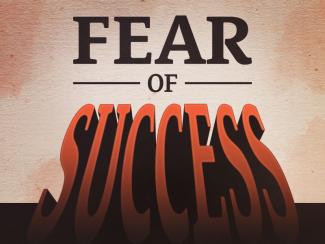
Fear of Success
DIS and DAT - Fear of Success - September 2020
Our periodic communication that reminds you to ask, “Should I react to those headlines?”
“Too high, Too High” Major League Movie
“Our deepest fear is not that we are inadequate. Our deepest fear is that we are powerful beyond measure.” Marianne Williamson
I’ve previously discussed the fear of missing out (FOMO) in this edition. More recently, I discussed the idea of fear itself in this edition. Today, I’m sharing another fear that’s plagued many investors, one that is hard to admit or even recognize: The fear of success. The fear of success has recently returned to my mind, while thinking about how quickly the markets have bounced back. That quick rebound seems to have brought with it a level of comfort yet at the same time a sense of uneasiness. I will try to describe what I think is going on with market psychology. It may be necessary that we remind ourselves that “market psychology”, involves a little piece of each of our thoughts and actions.
I used to ask, “What, me? Afraid of success? How ridiculous, I definitely want success!” Then markets taught me a few things, as they are known to do. Yes, I have made this mistake before and likely will have a tough time not making it again. Before I share my own mishap with the fear of success, let’s explore how it manifests in the realm of investing.
The fear of success in investing can be summed up in the phrase, “I must sell this company I own because the stock price has risen too high.” To double down on the misery of that thought, you will probably find yourself wanting to hold on to a horrible company, telling yourself that the stock price is too low to sell. In our industry lingo, it amounts to “sell your winners and hold your losers.” To be successful in investing, you definitely will want to overcome this tendency.
Reggie and I share a little video clip, a saying that often reminds us to stop thinking like this. In the baseball comedy “Major League” (yes, it’s the movie with “wild thing” Charlie Sheen coming in to pitch relief), the Cleveland Indians are terrible at the beginning of the movie, and there are a few diehard fans in the cheap seats behind the outside fence. A loud crack of the bat occurs and the baseball is seen flying high and far, one of the fans yells, “TOO HIGH, TOO HIGH!” The ball clears the fence, clears their heads, and the other fans look at him bewilderingly before asking, “Too HIGH? What does that mean, too high?” You can watch the clip here: https://www.youtube.com/watch?v=CNocWHXlc4Q
What other ways might this investment vice show up in your thinking? Thoughts such as the following:
“Wow, I am surprised how fast this stock market has come back. What if….”
The election is won by that/those nutcases ( whoever is not your favorite candidate/party)?
The virus comes back but much worse?
Our enemies (China, Russia, North Korea, Iran) engage in something that harms us or our economy?
ALL VERY LOGICAL QUESTIONS!!!!
I think the illogical part creeps into our thinking when we believe that we have some advantage over all the other market participants (including those with inside knowledge) and believe we can profit from the coming market move if we only take XYZ action(s).
From my experience, Pandora’s Box gets very wicked and complex, and then the results are disappointing and frustrating. That’s why we made it our Point Number 4 in our 7 Key Reminders for an Investment Mindset located here: :https://fluxconsole.com/files/item/422/74994/Important%20Investment%20Reminders.pdf
Key reminder Number 4 says, “We have no skill in predicting market moves, economic cycles, nor political events, etc. “ We find that reviewing these 7 helps to calm us down when the market movements play with our emotions.
So you may ask if we have no skill in profiting from predicting those events, then what’s the alternative?
A great starting point is to first set aside the necessary years of living expenses to avoid having to play the prediction game (3-5 years, somewhere in that range is our educated guess). Then for the remaining “eligible investment funds,” we believe that a business-like approach should be followed. We have seen that analyzing the business that underlies the stock itself has proved far more effective than trying to guess how individual investments will fare.
Reggie did a good job attempting to explain parts of it in our mid year update, so I’ll just copy him here:
First and foremost, none of us here at Advisor.Investments is a doctor. There are a lot of opinions on what happens next with this virus, but for me to make a guess or a prediction would be foolish. And to make a call on the markets because of the virus would only be more foolish. If it wasn’t the virus, it would be the upcoming elections. Or the protests and riots. Or the trade war with China.
We had previously written a piece on how to prepare for an investment storm that can be seen at the following link.
http://www.advisor.investments/blog/may-2017-hurricane-season-revisited-9-steps-prepare-investment-storm.
So how does one invest when the companies themselves are withdrawing guidance because they are unsure of the impact the shutdown will have on their business? What is a reasonable P/E multiple, when the E (Earnings) is obviously much lower now? Or what does the Discounted Cash Flows look like if the cash flows get cut substantially? Is this a one-, two-, or three-quarter economic event?
To help ease your anxiety with so much uncertainty around the current economic environment, here is just a little insight in what we look for in the businesses we purchase in your portfolio:
1. First thing is what we like to call our “circle of competence.” Is this a business we can understand? Where do the revenues come from? What does it take to reinvest in the business? We screen through hundreds of companies and come across many that may look “cheap” by the numbers. But if it isn’t something we can understand, we will pass. But that doesn’t mean it won’t be a good investment.
2. Does the company have a competitive advantage over its competitors?
3. Can the business produce and sustain high returns on capital/equity?
4. Is management engaged/shareholder-friendly? Efficient uses of shareholders’ capital? Does management reinvest in business?
5. What is a reasonable price to pay for a business? How will you as a shareholder get a return on your investment? Share buybacks/dividends/growth through return on invested capital?
In essence, our strategy involves lengthening the time horizon. The playing field there is less crowded, and we can rely more on our analytical skills around accounting, business, and financial analysis instead of our prediction skills. An investment approach of that type also requires a healthy dose of patience, which keeps most other participants away.
To circle back now to my own painful lesson regarding the fear of success (I was hoping that you would forget to ask), the story occurs around November 2013. That’s when I remember a nervousness in my stomach. The financial crisis had passed, some of the strong companies that were purchased started to come back quite nicely. I was afraid of a pullback in stock prices, and I hoped the feeling would pass. I watched the stock tickers, and they kept going up… oh, no! (Some psychologist say it’s similar to a human’s fear of heights…another of my own fears.) Eventually, the fear overtook me. I made the decision to reposition from the more successful-in-price positions into what I thought were more value-oriented opportunities. In other words, they had lower Price to earnings ratios, price-to-book ratios, etc.
In the end, the market did not reward the cheaper stocks that looked more attractive to me. The market prices didn’t correct as I feared. There was a larger shift toward digital occurring in our economy. It was a shot to my ego and a painful period for me. I painfully share this episode, in the hopes that I avoid a repetition of those actions.
The BIG CAUTION HERE is that just because you have reached some new level of success, your future success is NOT GUARANTEED. A continued effort and learning is usually required to maintain and progress pas that point. The future will still involve setbacks.
Of course, I have yet another baseball movie clip that Reggie and I share to illustrate this point of caution. One of my favorite movies of all time is Kevin Costner’s “Field of Dreams.” It has a lot of meaning for me as I played baseball in my youth and my dad was a huge baseball fan, coaching youth baseball until his death when I was 22 years old. The scene we share reminds us of “the big caution,” where Shoeless Joe is coaching the rookie “Doc” at bat. The pitcher had just thrown a pitch inside brushing him back for winking at him. Joe discusses the situation with the rookie and says to look for a pitch low and away. The final statement from Shoeless Joe: ”But…watch out for in your ear.” Here is that clip: https://www.youtube.com/watch?v=MELFuYpwsts
The movie clip and saying makes us ask… what if what we think will happen, doesn’t happen? I think the obvious event that can go wrong is the market can fall. My belief is that we should be prepared for that event (a pitch in your ear), but avoid the gamble of taking market actions (running out of the batters box) based on that prediction. “The pitch” may very well be low and away.
I hope this helps. Be safe.
Talk with you soon,
James
IMPORTANT DISCLOSURE INFORMATION
Please remember that past performance may not be indicative of future results. Different types of investments involve varying degrees of risk, and there can be no assurance that the future performance of any specific investment, investment strategy, or product (including the investments and/or investment strategies recommended or undertaken by Advisor.Investments), or any non-investment related content, made reference to directly or indirectly in this blog will be profitable, equal any corresponding indicated historical performance level(s), be suitable for your portfolio or individual situation, or prove successful. Due to various factors, including changing market conditions and/or applicable laws, the content may no longer be reflective of current opinions or positions. Moreover, you should not assume that any discussion or information contained in this blog serves as the receipt of, or as a substitute for, personalized investment advice from Advisor.Investments. Please remember that if you are a Advisor.Investments client, it remains your responsibility to advise Advisor.Investments, in writing, if there are any changes in your personal/financial situation or investment objectives for the purpose of reviewing/evaluating/revising our previous recommendations and/or services, or if you would like to impose, add, or to modify any reasonable restrictions to our investment advisory services. To the extent that a reader has any questions regarding the applicability of any specific issue discussed above to his/her individual situation, he/she is encouraged to consult with the professional advisor of his/her choosing. Advisor.Investments is neither a law firm nor a certified public accounting firm and no portion of the blog content should be construed as legal or accounting advice. A copy of Advisor.Investments’ current written disclosure Brochure discussing our advisory services and fees is available for review upon request. Please Note: Advisor.Investments does not make any representations or warranties as to the accuracy, timeliness, suitability, completeness, or relevance of any information prepared by any unaffiliated third party, whether linked to Advisor.Investments’ web site or blog or incorporated herein, and takes no responsibility for any such content. All such information is provided solely for convenience purposes only and all users thereof should be guided accordingly.

